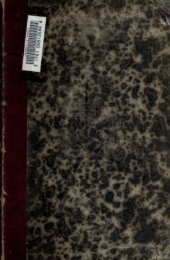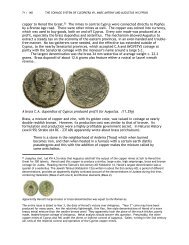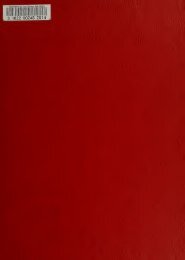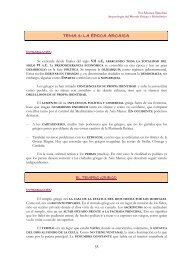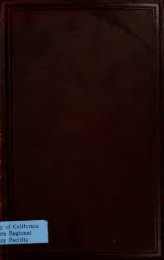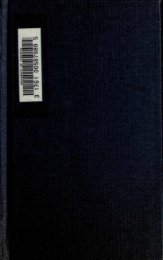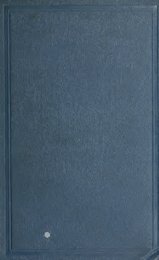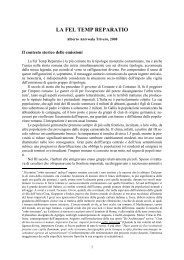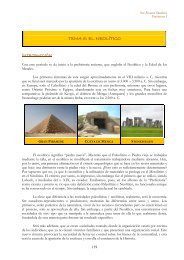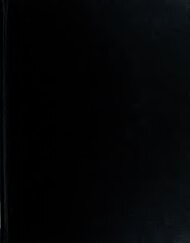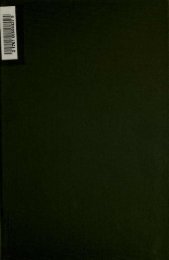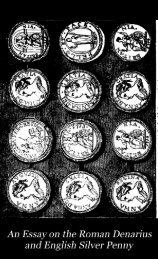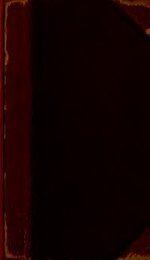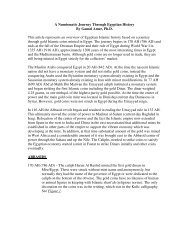The Weber collection; Greek coins ... - Forvm Ancient Coins
The Weber collection; Greek coins ... - Forvm Ancient Coins
The Weber collection; Greek coins ... - Forvm Ancient Coins
Create successful ePaper yourself
Turn your PDF publications into a flip-book with our unique Google optimized e-Paper software.
INTRODUCTION<br />
Conspicuous amongst the most important <strong>collection</strong>s of <strong>Greek</strong> <strong>coins</strong> ever formed by a pri-<br />
vate individual was that begun some forty years ago by the late Sir Hermann <strong>Weber</strong>, and purchas-<br />
ed en bloc from his executors at the end of December 19 18, by Messrs Spink & Son Limited,<br />
17 & 18 Piccadilly, London W.<br />
Sir Hermann <strong>Weber</strong> ' was born on December 30, 1823, at Holzkirchen, a small village in the<br />
North of Bavaria, where his father, a native of Bielefeld, resided as the administrator of an estate<br />
of Count Mensdorff-Pouilly. His mother, whose maiden name was Ruperti, was said to be of<br />
Italian descent, one of her ancestors having come from Italy in the suite of one of the Prince-<br />
Abbots of Fulda. Young Hermann spent his early life on his father's farm and there developed<br />
that love for open-air life, which, later in his medical career, he so strongly recommended, and<br />
which perhaps led him to take such a prominent interest in the subject of climatotherapy . At<br />
the<br />
age of nine he was sent to a private school at Wurzburg, and in 1838, he was transferred to the<br />
Gymnasium at Fulda, to which town the family had removed from Holzkirchen. After passing<br />
his matriculation, he began medical studies at Marburg University, 1844, to pursue them later at<br />
Bonn, where in 1848 he took the M. D. degree, and started to practise as a physician.<br />
From early youth, a great admiration for Skakespeare's plays, had led <strong>Weber</strong> to study the<br />
English language. His university teachers were apparently in the habit of attaching him as a<br />
guide to English visitors who came to them bearing letters of introduction. Thus it was that he<br />
made the acquaintance of Sir James Simpson, and it was doubtless in that way that at Marburg<br />
he had met Carlyle, of whom he always kept the most pleasant re<strong>collection</strong>s. Of great influence<br />
on his later life was his intercourse with the English colony residing at Bonn, where he was<br />
brought into professional contact with Sir Peregrine and Lady Sarah Maitland, Colonel (later<br />
Major-General Sir Henry) Havelock, the Turtons, and many distinguished visitors and residents<br />
at the famous university town. His love for England and the British led him to apply for the<br />
vacant post of Resident Medical Officer of the London German Hospital (at Dalston), to which<br />
he was elected in May 185 1, becoming afterwards physician and consulting physician to the<br />
Hospital. On the completion of this appointment, he decided to start a practice as a physician in<br />
London, giving up the idea of returning to Germany, a disposition which was confirmed by his<br />
1. Notes culled from " Autobiographical Reminiscences of Sir Hermann <strong>Weber</strong>, written for the family; with Anno-<br />
tations, and a list of his Medical Works, by his son, Frederick Parkes <strong>Weber</strong>", London, 1919. Privately printed for<br />
Dr F. P. <strong>Weber</strong>. — Through the kindness and courtesy of Dr F. P. <strong>Weber</strong> I was able to consult this monograph, and<br />
obtained permission to reproduce for a frontispiece of the Catalogue the excellent portrait of Sir Hermann <strong>Weber</strong>,<br />
taken in 1908.<br />
— XI —



